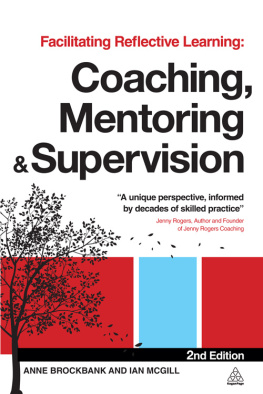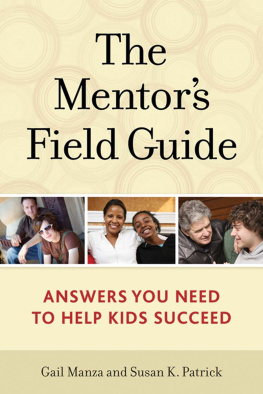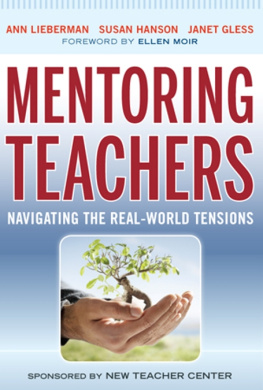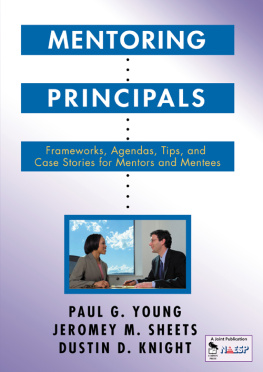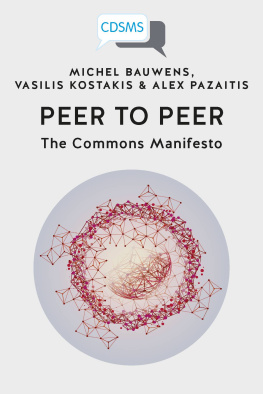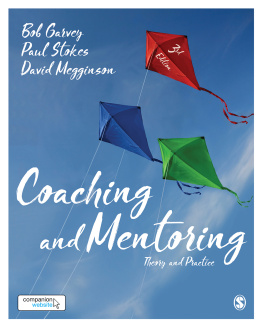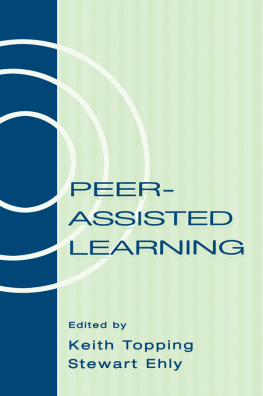The Students Guide to Peer Mentoring
For a complete listing of all our titles in this area please visit
www.palgravehighered.com/study-skills
Palgrave Study Skills
Business Degree Success
Career Skills
Cite Them Right (10th edn)
Critical Thinking Skills (3rd edn)
Dissertations and Project Reports
e-Learning Skills (2nd edn)
The Exam Skills Handbook (2nd edn)
Get Sorted
The Graduate Career Guidebook
Great Ways to Learn Anatomy and Physiology (2nd edn)
How to Begin Studying English Literature (4th edn)
How to Study Foreign Languages
How to Study Linguistics (2nd edn)
How to Use Your Reading in Your Essays (2nd edn)
How to Write Better Essays (3rd edn)
How to Write Your Undergraduate Dissertation (2nd edn)
Improve Your Grammar (2nd edn)
Information Skills
The International Student Handbook
The Mature Students Guide to Writing (3rd edn)
The Mature Students Handbook
The Palgrave Student Planner
The Personal Tutors Handbook
Practical Criticism
Presentation Skills for Students (3rd edn)
The Principles of Writing in Psychology
Professional Writing (3rd edn)
Researching Online
Skills for Success (3rd edn)
Smart Thinking
The Students Guide to Writing (3rd edn)
The Student Phrase Book
Study Skills Connected
Study Skills for International Postgraduates
Study Skills for Speakers of English as a Second Language
The Study Skills Handbook (4th edn)
Studying History (3rd edn)
Studying Law (4th edn)
Studying Modern Drama (2nd edn)
Studying Psychology (2nd edn)
Success in Academic Writing
Teaching Study Skills and Supporting Learning
The Undergraduate Research Handbook
The Work-Based Learning Student Handbook (2nd edn)
Work Placements A Survival Guide for Students
Write it Right (2nd edn)
Writing for Engineers (3rd edn)
Writing for Law
Writing for Nursing and Midwifery Students (2nd edn)
Writing History Essays (2nd edn)
You2Uni: Decide. Prepare. Apply
Pocket Study Skills
14 Days to Exam Success
Analyzing a Case Study
Brilliant Writing Tips for Students
Completing Your PhD
Doing Research
Getting Critical (2nd edn)
Planning Your Dissertation
Planning Your Essay (2nd edn)
Planning Your PhD
Posters and Presentations
Reading and Making Notes (2nd edn)
Referencing and Understanding Plagiarism
Reflective Writing
Report Writing
Science Study Skills
Studying with Dyslexia
Success in Groupwork
Time Management
Wheres Your Argument?
Writing for University (2nd edn)
Palgrave Career Skills
Excel at Graduate Interviews
The Students Guide to Peer Mentoring
Get More From Your University Experience
Louise Frith, Gina May and Amanda Pocklington

Louise Frith, Gina May and Amanda Pocklington 2017
All rights reserved. No reproduction, copy or transmission of this publication may be made without written permission.
No portion of this publication may be reproduced, copied or transmitted save with written permission or in accordance with the provisions of the Copyright, Designs and Patents Act 1988, or under the terms of any licence permitting limited copying issued by the Copyright Licensing Agency, Saffron House, 610 Kirby Street, London EC1N 8TS.
Any person who does any unauthorized act in relation to this publication may be liable to criminal prosecution and civil claims for damages.
The authors have asserted their rights to be identified as the authors of this work in accordance with the Copyright, Designs and Patents Act 1988.
First published 2017 by
PALGRAVE
Palgrave in the UK is an imprint of Macmillan Publishers Limited, registered in England, company number 785998, of 4 Crinan Street, London, N1 9XW.
Palgrave and Macmillan are registered trademarks in the United States, the United Kingdom, Europe and other countries.
ISBN 9781137599957 paperback
This book is printed on paper suitable for recycling and made from fully managed and sustained forest sources. Logging, pulping and manufacturing processes are expected to conform to the environmental regulations of the country of origin.
A catalogue record for this book is available from the British Library.
A catalog record for this book is available from the Library of Congress.
Acknowledgements
Our special thanks go to colleagues at the University of Kent in the Student Learning Advisory Service and at the University of Exeter in the Academic Skills and Engagement Team. We would also like to thank all of the students who have worked as peer mentors and volunteered as mentees over the years at both Kent and Exeter Universities. We have benefited from their commitment, enthusiasm and feedback on peer mentoring. In particular we would like to acknowledge the support we have received from Palgrave editorial and production teams and in particular the help we have been given by Commissioning Editor Helen Caunce.
Chapter
Introduction
As you start to read this book, try to think about the people throughout your education who have been influential. They might have been a classroom assistant or a teacher during your early years as a child at school; a sports or music teacher who inspired you; or possibly a friend or older family member who supported your development or encouraged you to persist when you felt like giving up. The role other people play in your educational journey can have a huge impact on your development, so the role of peer mentor is of great importance. This book is aimed primarily at peer mentors in higher education settings. It will provide you with a context, and framework for mentoring and give you specific guidance on some of the common issues and tricky aspects of being a mentor so that you get the most out of the experience and your mentees find your input helpful.
We know that peer-led learning is a growing and vital area in higher education that has the potential to transform the way in which learning takes place. We also hope that academic skills practitioners and others who support the development of mentoring activities in universities will find this a useful handbook to refer to. Although there is a logical progression through each of the chapters, it is not necessary to read this book from cover to cover. Each chapter has exercises within it to enable you to pause and think about your response to what you have read. These exercises can be done individually, but they also lend themselves to group work, so the book can be used in training or other mentor support programmes. Hopefully it is something you will dip in and out of during your time as a mentor, and it may also be useful to you after you finish mentoring as an aide-memoire for the experiences you had as a mentor. It may also help you to reflect on and communicate the skills you have developed to others, such as employers or admissions tutors. Although this book can be used to support mentor training, it is not a training manual and it certainly should not be used instead of targeted mentor training. It is a student guide to mentoring, which we hope will enhance your understanding of the role mentors play and help you to reflect on your experience of mentoring.
What is peer-led learning?
Peer-led learning, also referred to in this book as peer mentoring, has been around since the 1990s in the UK higher education sector. It is known by a wide variety of terms. The most common of these are peer-assisted learning (PAL) and peer-assisted study sessions (PASS), but there are many other terms that are used to describe the study and academic support that students give to students. This type of mentoring derives from supplemental instruction, which was developed in the in the 1970s at the University of Missouri Kansas City. Peer-led learning is now a common feature in many UK universities and is also becoming widespread in other European and Pacific universities. The concept of mentoring draws on educational research from a number of different perspectives, which emphasises, first, the importance of students feeling connected at a personal level to their university; second, collaborative learning pedagogy, which fosters links and interconnections between students to improve their learning; and, finally, mentor support for students to embrace their new academic identity.
Next page


